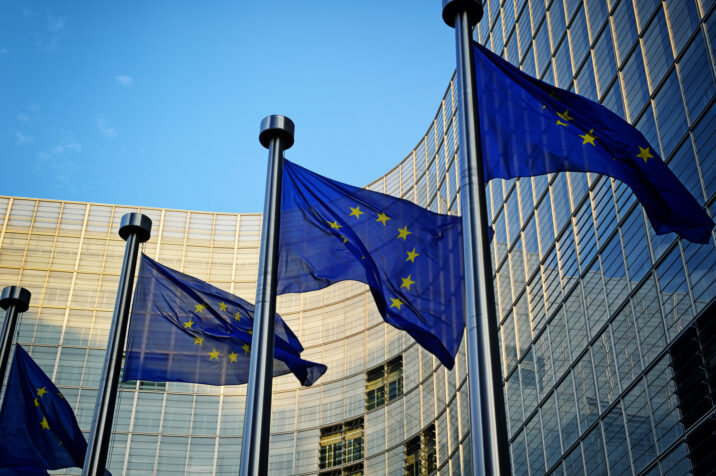
The lead negotiator for the EU’s sustainability Omnibus, Swedish MEP Jörgen Warborn, has set out his initial proposed changes, including a climate transition plan “reality check” and higher thresholds for the scope of application.
The political groups in the European Parliament continued to be heavily divided in an exchange of views on the Corporate Sustainability Reporting Directive (CSRD) and Corporate Sustainability Due Diligence Directive (CSDDD) this week.
Omnibus rapporteur Warborn, who is leading the negotiations on behalf of the centre-right European People’s Party (EPP), was keen to highlight the need to move “swiftly and smoothly”, and to cut costs “even more” than what the European Commission has proposed.
Warborn outlined his initial “headline” proposals, which included a “reality check” on climate transition plans and ensuring the proposed “shield” for smaller companies “will actually work”.
The MEP also said he would like alignment on scope for all regulations in the sustainability Omnibus, and that this should be set using a higher threshold than the currently proposed 1,000 employees.
Responding to this point, Ralf Sauer – co-lead for legislative negotiations on CSDDD at DG JUST – stressed that the Commission made a “conscious choice” not to touch the scope of application for the CSDDD, given that this was already a difficult compromise reached during the negotiations on the directive.
The rules phase in the application of the directive, but it will eventually apply to companies with more than 1,000 employees and a turnover of more than €450 million.
On CSDDD specifically, Warborn said he would like to use the term “chain of activities” instead of “value chain” to give more clarity to businesses, and for there to be clearer language in an article dealing with identifying and assessing actual and potential adverse impacts.
Finally, the rapporteur backed the Commission’s proposals on limiting due diligence to direct business partners, as well as plans to remove civil liability.
Shadow rapporteur views
Right-wing MEPs from the Patriots for Europe and European Conservatives and Reformists Group (ECR) continue to advocate for deleting all reporting and due diligence requirements.
The shadow rapporteur for the Patriots, French MEP Pascale Piera, called the Commission’s proposal “unsatisfactory” because it “does not counter the negative impacts of the standards”.
She added that the group plans to table amendments to “save what remains of our economies” and put companies first.
Turning to the ECR, Polish MEP Tobiasz Bocheński agreed that both directives should be “thrown out entirely”, especially since they have barely come into force and not yet had the chance to “truly impact” the European economy.
He said the party would support all proposals to remove unnecessary regulations, and called for postponing the directives by “at least 10 years” and making all reporting obligations voluntary.
Meanwhile, the S&D, Renew, Greens and the Left are all pushing to ensure the core objectives of the regulations remain.
Renew shadow rapporteur Pascal Canfin has said the group is trying to keep the centre-majority to “preserve the rationale” behind the two regulations, adding that he hoped to “convert” some of the right-wing MEPs.
“The alternative majority is to kill the whole text, which of course is a possible alternative for the EPP, but not one Renew will support.”
He added that Renew would support more simplification of audit requirements under CSRD due to the many complaints from companies regarding this, and also disagreed with the Commission’s proposal on civil liability for CSDDD.
“There will now be 27 regimes [for civil liability] which is the exact opposite of simplification and a single market approach,” Canfin said, adding that Renew would “push for harmonisation”.
Speaking on behalf of Dutch MEP and former CSDDD rapporteur Lara Wolters, René Repasi said S&D has been “consistent” in its messaging, and that “slashing” enforcement mechanisms, requirements and scope “can hardly be described as simplification”.
The Greens also backed reviewing audit requirements and stressed their focus on maintaining the initial scope of the CSRD, while staying open to “targeted administrative provisions” related to the largest SMEs.
On the CSDDD, they argued that the changes to the civil liability clause goes against access for justice and “guarantees impunity” for companies. They also said that the decision to limit due diligence to direct business partners goes against the principle of due diligence as established by OECD guidelines and would render the provision “completely useless”.
Following the shadow rapporteurs’ comments, Warborn said it will be an “interesting report and negotiations, trying to find good compromises for European businesses and citizens”.
He acknowledged the core objectives of the regulations and said these must be taken into consideration, but stressed the need for a reality check to support companies.
The deadline to submit the report is June, with a vote on amendments to CSRD and CSDDD tentatively scheduled for October.
Separately, the Council of the European Union’s working group overseeing simplification will meet today to examine a draft document seen by Responsible Investor which outlines member state initial asks on CSRD and CSDDD.
ESRS update
Meanwhile, the sustainability reporting board (SRB) of EU standards body today voted to approve the European Sustainability Reporting Standards (ESRS) simplification work plan with 21 votes in favour and one abstention.
The abstention was from vice-chair Kerstin Lopatta, who last week was one of the 10 members of the 25-person board to vote against the work plan, when it failed to get approved.
The board held a further meeting today having missed its deadline to inform the Commission of its plans, according to the mandate it was given by EU financial services commissioner Maria Luís Albuquerque in late March.
A key change is that the workplan now states that the board “considers necessary to run a public consultation”, even if shorter than usual and in the summer period.
The European Commission’s team leader for sustainability reporting Tom Dodd was present at the meeting. He said that, while it will be up to Commissioner Maria Luís Albuquerque to approve the proposed workplan, it was the kind of document the Commission is expecting and it all looks “as positive as it could” at this stage.
“It gives us confidence that – in spite of the challenging deadlines – you have a credible plan in place to be able to deliver, including with public consultation, and we don’t underestimate the huge challenge this presents,” Dodd told the board.
In order to meet the Commission’s 31 October deadline for delivery of the revised ESRS, the timeline proposed would see EFRAG establish a “vision on actionable levers for substantial simplification” and gathering evidence from stakeholders, which the body is in the process of doing.
Then, from the second half of May to July, the EU standards body would draft and approve the drafts to amend the ESRS, before publishing these in August for a period of 30 to 45 days, to then finalise the revision for the October deadline.
According to EFRAG’s due process, a 120-day consultation period is usually required, or a reduced 60-day consultation period.
This, however, will not be feasible due to the “exceptionally short time” to conclude the ESRS simplification process.
